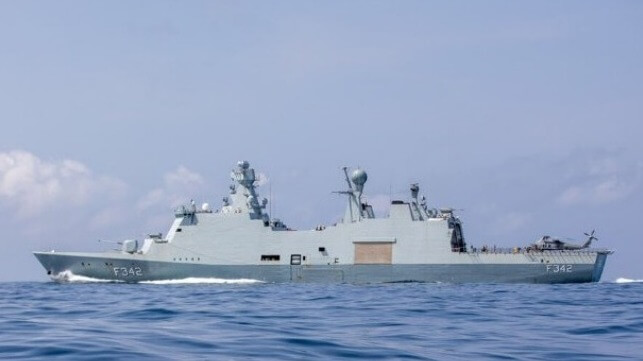Denmark Plans to Send Frigate to Support Ships and Crews Transiting Red Sea

Denmark’s Ministry of Defense, Forsvarsministeriet, and its Foreign Minister Lars Løkke Rasmussen announced plans to further support the maritime security efforts in the Red Sea. At the same time, the Danish Shipowners Association and trade unions also announced plans to compensate seafarers working on Danish-flagged ships operating in the newly defined high-risk area. All of this comes as Maersk has reported it plans to resume transits of the Red Sea.
"We are concerned about the serious situation unfolding in the Red Sea, where the unprovoked attacks against civilian shipping continue,” said Defense Minister Troels Lund Poulsen. “It is of crucial importance for both Danish and international ship traffic and for the development of the region that you can sail safely in the area. Denmark already contributes to maritime security in the area, and the government wants to increase the contribution by deploying a Danish frigate.”
Denmark has previously supported similar efforts by deploying a vessel to the region during the peak of Somali piracy. The Danish frigate Esbern Snare was also deployed in November 2021 to increase maritime security in the Gulf of Guinea. The vessel famously became involved in a firefight with the pirates when they attempted to intercept a suspected private boat. They killed four of the pirates and seriously wounded another ultimately leading to the pirate being sent to Denmark for medical treatment and to stand trial.
Currently, the Ministry of Defense says it has three staff officers assigned to the Combined Maritime Forces based in Bahrain. In January, the government will submit a resolution to the Danish Parliament to deploy a frigate to the Red Sea region. They said the vessel could arrive before the end of January 2024.
Denmark's move comes ahead of a possible action by the European Union. Reuters cited sources yesterday with confirmation from Germany and Spain that discussions were underway for an EU initiative in the Red Sea region. The EU has maintained its mission patrolling the region off Somalia and working to support Somalia in developing its security efforts. The EUNAVFOR mission Atalanta continues to coordinate defense against Somali pirates and is involved in the current situation with the Navibulgar bulker seized in the Arabian Sea and taken to Somalia earlier in the month.
As Maersk reported that it would be resuming transit of the region, the shipowners association Danse Rederier reports it has negotiated terms with the trade unions representing crewmembers. Starting tomorrow, December 30, crewmembers will be receiving a 100 percent bonus in addition to base pay for each 24-hour period their ship is in either of the two high-risk areas delineated by the International Bargaining Forum. This covers areas in the southern part of the Red Sea and the southern coast of Yemen.

that matters most
Get the latest maritime news delivered to your inbox daily.
"At Danske Rederier, we have very much welcomed the American-led operation Prosperity Guardian, which is to ensure the safe passage of civilian ships in the Red Sea. Today's agreement is based on ships passing through the area taking all the necessary safety measures as well as following all the guidelines that may be issued in connection with sailing in the area under the protection of operation Prosperity Guardian," said Anne Windfeldt Trolle, Director of Labor Market, Training and Recruitment at Danske Rederier.
Maersk suspended transits of the Red Sea nearly two weeks ago after the Houthis unsuccessfully targeted several containerships in the region, a step was that immediately followed by others including Hapag-Lloyd, CMA CGM, MSC Mediterranean Shipping Company, Ocean Network Express, HMM, Evergreen, and many other carriers. Maersk showed 15 routes being impacted but said this week it was beginning to send vessels back through the region with Reuters calculating on Thursday that most Maersk vessels would be back on their scheduled routes in the coming weeks.
